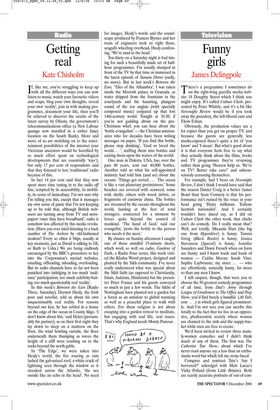Getting real
Kate Chisholm
If, like me, you’re struggling to keep up with all the different ways you can now listen to music, watch your favourite videos and soaps, blog your own thoughts, reveal your own ‘reality’, join in with making programmes, document your life, then you’ll be relieved to discover the results of the latest survey by Ofcom, the government’s telecommunications office (a New Labour quango now installed in a rather fancy location on the South Bank). More and more of us are switching on to the entertainment possibilities of the internet (our Victorian ancestors would be horrified by so much effort spent on technological developments that are essentially ‘toys’), but only 17 per cent of respondents said that they listened to less ‘traditional’ radio because of this.
In fact 14 per cent said that they now spent more time tuning in to the radio off line, tempted by its accessibility, its mobility, its sense of immediacy. I’m not sure why I’m telling you this, except that it massages my own sense of panic that I’m not keeping up to be told that, although British webusers are turning away from TV and newspapers ‘once they have broadband’, radio is somehow less affected by this media revolution. (Have you ever tried listening to a back number of The Archers by old-fashioned modem? Every so often it blips, usually at key moments, just as David is talking to Jill, or Ruth to Usha.) We are being endlessly encouraged by the BBC’s presenters to key into the Corporation’s myriad websites, emailing, offloading, inloading, overloading. But its radio channels have so far not been panicked into indulging in too much ‘audience’ participation, too much celebrity-baiting, too much questionably real ‘reality’.
In this week’s Between the Ears (Radio Three, Saturday), Dermot Healy, the Irish poet and novelist, told us about his own unquestionably real reality. For reasons beyond our ken, he has settled in a house on the edge of the ocean in County Sligo. ‘I don’t know about this,’ said Helen (presumably his partner), as on their first night they lay down to sleep on a mattress on the floor, the wind howling outside, the floor underneath them thumping as waves the height of a cliff were crashing on to the rocks beyond the north gable.
In ‘The Edge’, we were taken into Healy’s world, the fire roaring as rain lashed the galvanised roof, a white crack of lightning seen through the window as it streaked across the Atlantic, ‘the sea ouside like an echo in the head’. No need for images, Healy’s words and the soundscape produced by Frances Byrnes and her team of engineers took us right there, seagulls wheeling overhead, Healy confessing, ‘We’re mad in the head.’ Ten-thirty on a Saturday night is bad timing for such a beautifully made set of halfhour programmes. I’m usually slumped in front of the TV by that time or immersed in the latest episode of Tamara Drewe (sadly, no more). But in last week’s Between the Ears, ‘Tiles of the Alhambra’, I was taken inside the Moorish palace in Granada, as water dripped from the fountains in the courtyards and the haunting, plangent sound of the cor anglais (with specially composed music) conjured up that lost 14th-century world. Tonight at 10.30, if you’re not gadding about on the preChristmas whirl, you can hear about the ‘bottle evangelists’ — the Christian missionaries who for decades have been writing messages on paper, ‘If you find this bottle, please stop drinking’, ‘God so loved the world... ’, stuffing them into bottles and casting them upon the waters of the world.
One man in Dakota, USA, has, over the past 40 years, sent out 40,000 bottles. Another told us what his self-appointed ministry had told him (and us) about the oceans. ‘Things get sorted ... The ocean is like a vast planetary postmistress.’ Some beaches are covered with seaweed, some with shells; others with wood debris, or fragments of castaway china. The bottles are streamed by the oceans throughout the world, landing at the feet of total strangers, connected for a moment by forces quite beyond the control of mankind. ‘The hand of God,’ said our evangelist, ‘posts the bottle to the person who needs it the most.’ By chance on Sunday afternoon I caught one of those mindful 15-minute shorts, which work so well on radio. Gardens of Faith, a Radio Four series, this week visited the Khalsa Wood project, designed and planted by the Sikh community. I’ve never really understood what was special about the Sikh faith (as opposed to Christianity, Islam, Judaism, Hinduism) but the presenter Peter France and his guests conveyed so much in just a few words. The Sikhs of Nottingham have planted not a garden but a forest as an antidote to global warming as well as a peaceful place to walk with others. For them religion is not about escaping into a garden retreat to meditate, but engaging with real life, real issues. That’s why England needs Monty Panesar.


























































































 Previous page
Previous page